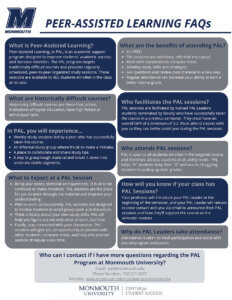PAL Frequently Asked Questions

What is Peer-Assisted Learning?
Peer-Assisted Learning, or PAL, is an academic support program designed to improve students’ academic success and increase retention. The PAL program targets traditionally difficult courses and provides regularly scheduled, peer-to-peer organized study sessions. These sessions are available to ALL students enrolled in the class at no cost.
What are historically difficulty courses?
Historically difficult courses are those that, across institutions of higher education, have high failure or withdrawal rates.
In PAL, you will experience….
- Weekly study sessions led by a peer who has successfully taken the course.
- An informal study group where it’s OK to make a mistake.
- A place to collaborate and share study tips.
- A way to grasp tough material and break it down into understandable segments.
What are the benefits of attending PAL?
- It’s FREE!
- PAL sessions are voluntary, informal and casual.
- Meet with classmates to compare notes.
- Develop study skills and strategies.
- Ask questions and review class material in a new way.
- Regular attendance can increase your ability to earn a better course grade.
Who facilitates the PAL sessions?
PAL sessions are facilitated by trained PAL Leaders: students nominated by faculty who have successfully taken the course in a previous semester. They must have an overall GPA of a minimum of 3.2. Most attend classes with you so they can better assist you during the PAL sessions.
Who attends PAL sessions?
PAL is open to all students enrolled in the targeted course and therefore attracts students of all ability levels. PAL helps “A” students keep their “A” and assists struggling students in pulling up their grades.
What to expect at a PAL session?
- Bring your notes, textbook and questions. It is ok to be confused or make mistakes! PAL sessions are the place for you to work through the material and improve your understanding.
- Plan to work collaboratively. PAL sessions are designed to involve students in small group work and discussion.
- Think critically about your own study skills. PAL will help you figure out not only what to learn, but how!
- Finally, stay connected with your classmates. PAL sessions will give you an opportunity to connect with other students, compare notes, and help one another outside of regular class time.
How will you know if your class has PAL sessions?
Your professor will introduce your PAL Leader at the beginning of the semester, and your PAL Leader will remain in close contact with you via email to announce their PAL sessions and how they’ll support the course as the semester evolves. You can also check our PAL Group Sessions to see if your course is listed.
Why do PAL leaders take attendance?
Attendance is taken to track participation and assist with overall program evaluation.
Who can I contact if I have more questions regarding the PAL program at Monmouth University?
Email: pal@monmouth.edu
Phone Number: 732-571-3637
